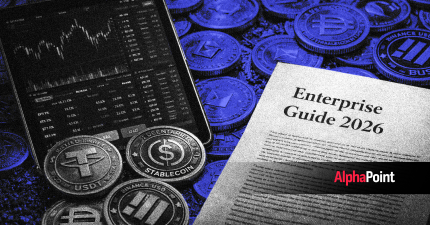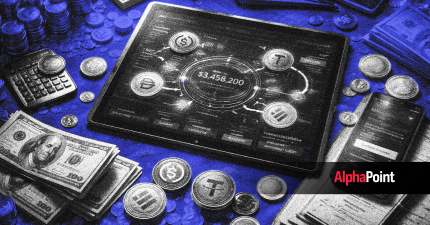Why Neobanks Are Embracing Crypto: A Look at the Benefits and Trends
Digital-first solutions are transforming the financial landscape by making banking more accessible and inclusive, particularly for those without access to traditional banks. Neobanks are leading this shift, embracing financial inclusion while addressing the needs of modern customers. With 71% of Americans managing their bank accounts online or via mobile apps, these innovative institutions have found a natural fit in today’s banking habits — and are now taking it a step further by adopting cryptocurrency.
Major neobanks like SoFi and Revolut have integrated crypto services into their platforms, enabling customers to diversify their portfolios directly within their accounts. This shift further differentiates neobanks from traditional banks, which have been slower to adopt crypto.
In this post, we explore why neobanks are embracing digital assets and whether this strategy could be right for your institution.
Why Are Neobanks Increasingly Integrating Cryptocurrency into Their Services?
As cryptocurrencies gain popularity, financial institutions are increasingly adopting crypto services — and neobanks are leading the charge, with many already offering these options to their users.
Here’s why customer-centric banks are embracing crypto:
1. Meeting Growing Consumer Demand for Crypto Access
More people are actively investing in cryptocurrencies and considering them as payment solutions. Roughly 93 million Americans currently own crypto, with an additional 29 million expected to join the market soon. Neobanks are seizing this opportunity to provide crypto services that meet evolving customer needs.
Furthermore, the majority of crypto owners (85%) prefer to buy directly from their financial institutions, making it increasingly important for neobanks to integrate these services to retain and grow their user base.
2. Differentiation in a Competitive Market
As some traditional banks adapt to the digital age with enhanced services, the neobanking market faces growing competition for users’ attention.
To distinguish themselves, many neobanks have turned to crypto within the broader digital banking landscape. By integrating crypto services, neobanks allow customers to diversify their portfolios directly from their accounts, differentiating themselves from both traditional banking systems and other fintech providers. This approach supports customer acquisition and retention in a highly competitive market.
3. Enabling Faster and Lower-Cost Transactions
Neobanks are also integrating crypto services to cater to customers with cross-border payment needs.
Cryptocurrencies operate on decentralized blockchain networks, eliminating the need for conventional banking intermediaries. This results in lower transaction costs and faster processing times, facilitating more efficient, borderless payments. These benefits attract customers who seek affordable and convenient cross-border payment solutions.
4. Leveraging Blockchain’s Transparency and Security
Blockchain technology — the backbone of many cryptocurrencies — has played a key role in driving neobanks‘ widespread adoption of crypto. With its inherent security and transparency features, blockchain helps position neobanks as trustworthy financial solutions.
Each transaction is recorded on a public ledger and verified by a decentralized network of nodes, rather than a central authority, creating an auditable and transparent trail. This particularly appeals to younger, tech-savvy demographics looking for innovative, reliable, and trustworthy banking solutions.
5. Expanding Revenue Streams
Neobanks typically rely on revenue from interest on deposits and interchange fees from transactions. However, without a large customer base, these revenue streams may not be enough to support substantial growth. To address this, some providers are turning to crypto.
By integrating crypto services, neobanks enable users to buy, sell, and hold cryptocurrencies directly within their accounts. This expands their revenue streams and broadens profit margins, with potential earnings from transaction fees on crypto trades, spreads on conversions, and even custody services for digital assets.
6. Future-Proofing in a Rapidly Evolving Financial Landscape
The financial industry is constantly evolving, with decentralized finance (DeFi), cryptocurrencies, and advanced banking technologies like blockchain networks at the forefront.
Early adoptions of crypto positions neobanks to remain competitive as the market advances. This proactive approach enables them to adapt more quickly to changing crypto regulations and meet rising technological expectations without requiring a complete infrastructure overhaul.
7. Strengthening Customer Loyalty Through Education and Accessibility
Crypto adoption offers neobanks an additional way to attract new users and strengthen customer loyalty, particularly among underserved populations. By offering accessible, user-friendly crypto services, neobanks can reach unbanked or underbanked individuals who may lack access to the banking sector.
Through integrated crypto offerings and educational resources, neobanks provide a bridge to financial services for these customers, promoting financial inclusion while strengthening customer engagement and trust.
Trends in Neobank Crypto Adoption
As neobanks dive deeper into the crypto space, several key trends are shaping how they approach digital assets. These emerging strategies not only meet customer demand but also enhance their competitive edge in the financial sector.
Crypto Wallets and Custody Services
Many crypto-friendly neobanks now offer digital wallets and secure custody services, giving users safe access to their digital assets.
Neobanks that integrate crypto wallets within their banking apps allow users to buy, hold, and manage their cryptocurrencies alongside their traditional bank accounts. This integration simplifies viewing both crypto and fiat balances and enables seamless trading between the two, eliminating the need for multiple platforms.
Neobanks offering custody services often partner with established providers like BitGo and Fireblocks. These partnerships enable advanced security measures, such as cold storage and multi-signature wallets, to protect customers’ assets.
By providing digital wallets and secure custody services, neobanks position themselves as comprehensive crypto management hubs, setting themselves apart from traditional banking solutions.
Expanding Investment Options
Neobanks are broadening their investment offerings by including popular cryptocurrencies like Bitcoin and Ethereum, as well as stablecoins like USD Coin (USDC). This approach makes digital assets more accessible to everyday users, giving them opportunities to diversify their portfolios.
Offering cryptocurrencies enables neobanks to provide customers with high potential returns and a means to hedge against inflationary pressures.
DeFi and Yield-Generating Services
As part of their crypto adoption strategy, neobanks are increasingly exploring decentralized finance (DeFi) to offer yield-generating services. This gives customers new ways to grow their assets.
Some neobanks tap into DeFi protocols that allow users to stake their crypto holdings — staking involves locking up digital tokens in a blockchain network to support transaction validation. In return, users can earn staking rewards, providing a form of passive income for those who prefer not to trade actively.
Partnerships with Blockchain Firms and Crypto Providers
Building crypto offerings from scratch can be both expensive and time-intensive. To launch these services quickly and more cost-effectively, many neobanks form partnerships with blockchain and crypto firms.
These collaborations boost neobanks‘ technical capabilities, allowing them to expand their crypto services without straining resources.
Key Considerations for Neobanks Adopting Crypto
For successful launches and sustainable growth, neobanks need to consider several factors before adopting crypto. These include:
Regulatory Compliance
As the crypto landscape continues to evolve, jurisdictions are increasingly implementing regulations to protect investors. Neobanks must comply with these standards to ensure uninterrupted operations.
Regulations vary across regions. For instance, while crypto is still largely unregulated in the U.S., providers must adhere to KYC/AML (Know Your Customer/Anti-Money Laundering) guidelines. This means they must monitor their customers and transactions to prevent fraud, money laundering, tax evasion, and other illegal activities on their platforms.
Meanwhile, neobanks in the European market must comply with the Markets in Crypto-Assets Regulation (MiCA) and privacy laws such as the General Data Protection Regulation (GDPR).
Partnering with legal professionals who understand the crypto landscape in your operating region is essential to ensure regulatory compliance.
Managing Volatility
The crypto market is known for its volatility. While this can create opportunities for significant gains, it also affects user experiences, especially for those who are risk-averse or new to crypto.
To provide more stable banking experiences, neobanks can offer stablecoins alongside standard cryptocurrencies. Pegged to fiat currencies, stablecoins are less volatile than assets like Bitcoin. By including this option, neobanks can help risk-averse investors protect their holdings.
Consumer Education
Many investors are still relatively new to cryptocurrency. To capture their interest, neobanks can offer educational materials such as FAQs and interactive guides that cover topics from basic crypto concepts to practical wallet management. These resources can help users better understand the market and build confidence in crypto assets.
It’s also valuable to include information on the inherent risks of cryptocurrency, such as price volatility and asset security, along with strategies for managing these risks. Providing this balanced view builds customer trust by showing a commitment to supporting them through both the rewards and challenges of the crypto market.
Whenever possible, offer access to a dedicated customer support team for crypto services. This gives users a resource for questions beyond the provided materials, further building trust and helping ease initial resistance.
How AlphaPoint Is Empowering Neobanks‘ Crypto Efforts
Many neobanks already recognize the value of integrating crypto services into their offerings. These services open up new revenue streams, streamline transactions, and meet the growing demand for digital assets. For those looking to stand out in the competitive financial ecosystem, crypto offerings serve as a powerful differentiator.
Partnering with a reputable crypto provider like AlphaPoint can simplify your launch, enabling you to offer reliable crypto services in weeks rather than months. With cutting-edge infrastructure — including wallet solutions, liquidity options, and expert advisory services — AlphaPoint equips you with everything needed to launch and sustain your services successfully.
Ready to provide crypto services and elevate your neobank offerings? Schedule a consultation with AlphaPoint today.
About the author
Igor Telyatnikov, Co-Founder & CEO of AlphaPoint, leads its white-label digital platform, powering global crypto marketplaces with over 20 years of expertise in financial technology and innovation. Connect with him on LinkedIn.


